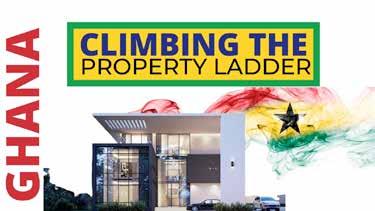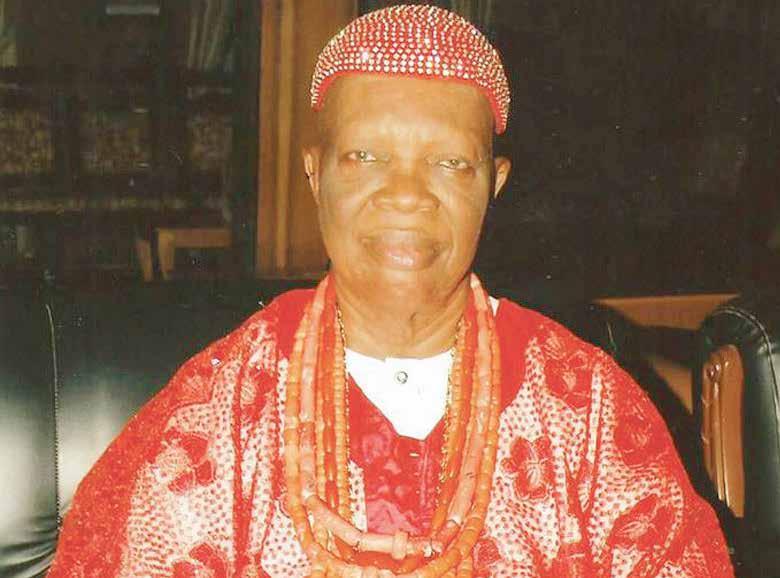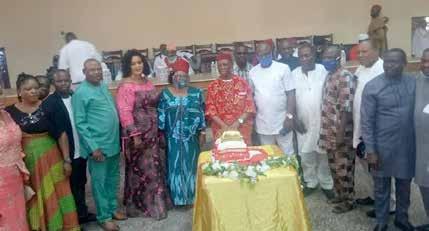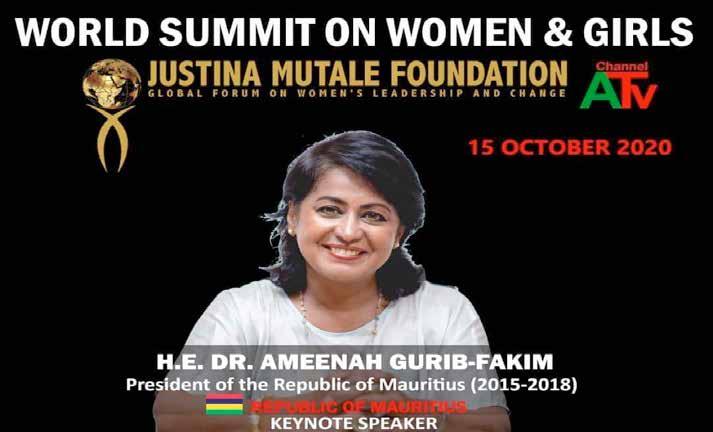
15 minute read
The Chakwera Model in the Africa we want
The President of Malawi, Lazarus Chakwera, has in his weekly radio address to the nation in which he updates the citizens on progress made and sets down the tone and direction of his leadership. Last month’s address was perhaps the most interesting yet and it is attracting comments around the continent. This, in part, is what he said: “Fellow Malawians, “I have noted with delight that there is much interest in my plans to trim the powers of the President. Because of that interest, I am confident that when this project is well underway, it will have your full support. “Reducing presidential powers is something that is often promised but never delivered, but I think you know by now that I do not say something unless I mean to do it. But to get this done, I need your support. “But it is important that we all understand what these powers are. “The first category of powers a President has is ‘Positional’. In our jurisdiction, there are certain positions and offices that are reserved for the President alone, such as the positions of Head of State, Head of Government, and Commanderin-Chief of the Armed Forces. “It is time we reviewed the merits of having the President also occupy an office like the Chancellor of a public University. This is a relic from a bygone era. I know of no free country in which the State President is at helm of an institution that exists to produce free thinkers. Second category has to do with certain decisions that are reserved for a President to make. It’s my view that there are too many decisions made by a President, so I mean to reduce that. Having a President make too many decisions has created problems for our country for a long time. “There must be decisions that when made by Parliament are final, and even where the President has the power to veto such decisions, he should no longer be allowed to sabotage
the governance framework by sitting on the decision. The third category of powers a President has is that of appointments. From the Judiciary, to the Legislature, to the Executive, all the way to constitutionally mandated institutions designed to operate independently, the boards of statutory corporations, foreign embassies. We have the anomaly of having all of them look to the president as the appointing authority. This is unwise. No person is good or humble enough to be entrusted with that much appointing power. The fourth category of Presidential powers which need trimming is cultural. We need to review our behaviors towards a president, because how we behave around a president is what creates a national perception of how much power he or she has. This includes how we address a President, *how many times a President is mentioned in salutations at a single event , how many cars and firepower a President’s convoy has, and so forth... “During the campaign for presidential elections, I noted that many political campaigns conducted by state officials were using state resources like state vehicles and state security. We need to think about the limits and parameters of this culture because it is now regularly abused. “Even if it may not be possible to fully separate state resources from the activities of political parties, we need rules that clearly spell out when the overlap between party and state is acceptable and when it is abusive. When I propose laws to address these inconsistencies, I ask you to support me by demanding that your MPs vote for these changes. Malawi needs a more empowered citizenry. The way to achieve that is to increase the powers of governance institutions and decrease powers of the President With this mind set of an African President, there is a ray of light shining through Africa; may it become a beam. We wait to see if many other African nations will copy or adopt for their President.
Advertisement
Kojo Addo-Kufuor: Mortgages in Ghana; the myths and facts
If you are renting now, buying a home could be a better financial decision. Of course, that depends on several factors such as; where you live, how much you pay now as rent, an available fit-for-purpose house you can afford, current mortgage interest rates and your aspirations. Taking your first steps towards homeownership – and getting a foot on the property ladder – can be an exciting journey. Apart from the financial aspect, it is also important that you’re armed with information – and the right information at that – before you start your journey to homeownership. “While it is important to do your research during the home-buying process, you must not believe everything you hear.”, he says. You could do with all the help to make an outright purchase, or get a loan to buy that land, build that house or buy out that cozy property in that estate you’ve been eying for some time. Contrary to what you may have heard, getting a mortgage does not require perfect credit or a large down payment. It is, however, safe to say you should get your finances in order before you start house hunting or talking to lenders. Kojo Addo-Kufuor, in this piece, helps you split the assumptions, untruths and the gaps in the public knowledge on acquiring a home loan. Many people in their 20s and 30s think of homeownership as a distant prospect; this is not exactly the case. Shared concerns and experience have shown that young people see the deposit as the biggest obstacle to getting on the ladder.
It is not that terrible a prospect. You can now get a home loan offer of up to 100% property’s value if you are resident in Ghana and up to 70% if you are non-resident. This means it is possible to buy a house without making any down payment at all. First National Bank’s innovative First Time Buyer home loan product is best suited for young professionals or executives who have just graduated into their first jobs, and/or supplemented by other revenue lines. Such young professionals or executives could easily get to translate their monthly rent into monthly mortgage repayments towards the purchase of their own property. In fact, over 60% of the home loan client base are below age 45. It’s also important to consider that with your mortgage repayments, you’re adding to the equity you own in the property with each installment paid, whereas this is not
the case when you pay rent as a tenant. The truth is lots of people believe that their existing bank is the one and only place to go when it’s time to think about a mortgage. That is probably because your bank will regularly send advertising material on what they can offer relatively along with preferential rates. It, however, makes sense to look around some more. The banking industry in Ghana is quite diversified, and banks are adding on to their portfolio with the right partnerships. First National Bank after merging with the erstwhile GHL Bank, has enhanced its home loan portfolio to serve many more Ghanaians with products which hitherto wasn’t accessible.

If you are a salaried worker, you can access the broad suite of regular home loans. If you are a business owner or have multiple revenue streams, the innovative Save
To-Own home loan is best suited; just by demonstrating your ability to repay with a monthly deposit into an account for a year or two and then you have a home loan. It’s obvious that you’ll struggle to get a mortgage with a bad credit history. The assessment of your application goes beyond that. Your credit history and your current ability to settle such gaps could be considered in the process. Speak to a mortgage advisor at First National Bank Ghana. These people help you make the right choices for a home loan based on

I was indeed kidnapped by my nation. My country kidnapped me. I was kidnapped because my talent, my creativity, my innovation was hijacked by my country’s. My well-being has been kidnapped by my country. My assurance to good health and protection of life was kidnapped by my country’s. The so-called leaders are having my country kidnapped with their actions and inactions.
Where is reasoning for my freedom? My sleep was kidnapped by the policies, processes and
your responses to some background questions and then guide you appropriately through the process. It’s certainly right to think of the interest rate as to how much your mortgage actually ‘costs’, as this is what you pay to have your loan, on top of the equity you’re accruing in your property. But that’s not to say you should assume that the lowest interest rate means the cheapest mortgage. This is a common misconception that lenders see anyone, not in a full-time formal job as a risk. With the rise in freelancing, entrepreneurs, small business owners, side hustle enthusiasts, flexible and contract work in Ghana, banks like First National Bank Ghana take a much more individualistic approach when it comes to assessing people’s credit and underwriting situations. There’s every chance you can qualify for your home loan application provided your income is stable and sufficient for a comfortable repayment plan. While there are plenty of mortgage misconceptions floating around these days, from how hard it may be to qualify to how much you should put down, it’s important to learn the facts and how they apply to you. The truth is, getting a mortgage is much easier than you may think. If you need financing to buy a home, talk to First National Bank Ghana’s. Not doing so could delay homeownership, and the benefits you could gain by years.
procedures implemented by their governance and leadership. My freedom to move around in my community and my country was kidnapped by my leaders. All the freedoms and opportunities that we see in Advanced Nations. Kidnapped! We shall be free from these.

They put me on bad roads. They put me in darkness. They put me where there’s no health provision. They put me where humans shouldn’t be when you have the resources to look after yourself. They degraded my conscious and beliefs to freedom as a humanbeing. They took away my justice and rights. I enjoy the thought that one day with or without ransom we shall all be free from the kidnappers of good governance and leadership. By Alistair Soyode Founder, BEN TV, United Kingdom
Celebration of His Royal Highness: Obi Efeizomor 11 on the Throne of Owa kingdom for 61 years
Victor Efeizomor chronicles the accomplishment of His Royal Highness, Dr. Emmanuel Oyinke Efeizomor 11, Obi of Owa Kingdom, who turned 82 years old in March and 61 years on the throne in September 2020. When the people of Owa kingdom in Ika NorthEast Local Government Area of Delta State gathered on the 6th day of September 1959 to crown a young, dynamic and vibrant prince as the king of Owa kingdom, many never believed the crown would rest on the young king’s head for sixty-one years, more so when his father and grandfather did not spend up to forty years of age on the throne. In fact we are still counting as he is breaking all traditional records in the Kingdom The young king, soon after coronation, hit the ground running by deploying his managerial skills in bringing socio-economic and political development to his kingdom and beyond. Born into the Odogwu dynasty, the founder and the first king of Owa Kingdom, Dr. Emmanuel Oyinke Efeizomor 11, (JP),OON , has shown that he is a servant –leader per

excellence. He was crowned the Obi of Owa Kingdom as the 17th Obi of Owa on the 6th day of September 1959. He turned 82 years on March 10th, 2020. Background /Education He studied in Sapele, Port-Harcourt, Ibadan, Britain and the United States of America (USA). His exposure and experience equipped him with a clear vision and mission to transform Owa into a kingdom of civilized people and modernized structure. As a result of his wealth of knowledge acquired through aggressive reading and learning, Efeizomor II put in place a formidable administrative structure that attracted followership. He endeared himself to well-meaning people by working diligently on whatever assignment given to him. His commitment to the cause of his people, his determination and perseverance to succeed, his democratic leadership style, his advocacy for gender equality, and his intellectual prowess are all worthy of emulation. Obi Efeizomor II is seen as a monarch of towering stature. He is one of the most accomplished traditional rulers in Nigeria. His achievements during the past sixty years in office are a
testimony to his ability to adapt to ever changing social, economic and political situation. He is an icon of compassionate fatherhood whose values would continue to be a good reference point. His achievements can be seen in educational development of himself and his subjects, mobilization of Owa communities for self-help and community development, and active support for government to develop Owa Kingdom. Philanthropy

Efeizomor II formed, revived, mobilized and supported several community organizations of Ndiowa. Notable among these are Owa Patriotic Union, Owa Development Committee, Owa Youths Association and Boji-Boji Owa Community Development Committee and many others within the rural communities. He is assessable by his people no matter what the problem is, his palace is full of activities as people come and go to seek his wise counsel. He is a believer in the developmental philosophy of “heaven helps those who help themselves” By his self-help approach many roads, markets etc., were built and expanded. He ensured that educational facilities were made available in his domain. Thus in collaboration with the Christian missions and government; the following secondary schools were founded; Ika Grammar School, Boji-Boji Owa in 1960, Owa Grammar School, Owa-Oyibu in 1979, Owa-Alero Secondary / Commercial School, OwaAlero in 1979, Owanta Grammar School, Owanta in 1980, Owa-Alizomor Grammar School, and Owa-Alizomor in 1980. He gave active support to the establishment of Calvary Polytechnic, Owa-Oyibu and he is currently a visitor to the polytechnic. Right from the time of his coronation in 1959, successive governments and other well-meaning organsations have never failed to acknowledge Efeizomor’s immense contributions towards the peace, unity and development of Owa kingdom and beyond. Public Service He was a member, Western Regional House of Chiefs 1960 to 1963, member, Mid-West Region leaders of thought during the civil war, member Delta State Government delegation to several Northern State of Nigeria 1971 to date, member Bendel State Traditional Rulers Council 1967 to 1991; Director, Nigeria Cocoa Board 1979, Managing Director, Toprest (Nigeria) Limited, Insurance Brokers and firm of Building Contractor 1976, member Governing Council, Institute of Journalism, Benin City 1988 to 1990, Representative on WAEC State committee 1996 to 2004 and member, Committee on misuse of title, Delta State 2000 to 2006 among others. Efeizomor II was Chairman Ika and Asaba Divisional Income Tax Review tribunal 1961, Chairman panel on ways of improving/increasing government Tax collection in Ika Division; Chairman Ika Divisional Education Board 1973 to 1975, Chairman National Freedom from Hunger Campaign Bendel State 1974 to 1976, Chairman State Advisory Committee on Education for Citizenship 1977, Chairman Land Use Allocation Advisory Committee in Ika Local Government Area; Chairman Police Community Relations Committee 1985, Chairman Zonal Police Public Relations Committee, Ika, Ndokwa, Aniocha and Osimili Local Government Areas 1987 to 1992; Chairman EPI, ORT implementation committee Ika Local Government
Continued on Page 66

Continued from Page 65
area 1987, Chairman Ika MAMSER implementation committee 1987 to 1992, Chairman Committee on Land Dispute in Gbariagolor, Alidinma Scheme 1977 and Vice Chairman Presidential Panel on Warri Crisis 2003 among others. Recognitions Other awards and positions held by Obi Efeizomor II include Grand Patron of Owa Patriotic Union 1959 to date, Patron of Bendel East Cultural Association 1988, patron Izu Umunna Cultural Association of Nigeria, Jos, 1989, Grand Patron, English and Literary Students Association, Edo State University (now Ambrose Ali University Ekpoma) 1990 to 2003; Grand Patron, the Institute of Farmers of Nigeria 1994; Life Patron, Ika Media Practitioners Association of Nigeria (MPAN); Fellow, the Institute of Farmers of Nigeria Ibadan 1994; National Patron, National Traders and Market Leaders Council of Nigeria 2001 to date, Merit Award for Examination Ethics by Ministry of Education of Delta State 2004, Millennium Excellence Award by front line news media Lagos as the most worthy traditional ruler for the year 2003. In recognition of his contributions to the social-economic development of Nigeria 2004. Obi Efeizomor II was listed in Africa year Book “Who is Who” in 1977. Doctorate Degree in Education by the City University, Los Angeles, California, USA-7th April 1990. Fellow, Institute of Administration Management of Nigeria (FIAMN),Lagos -1992. Conferred with a National honour award of Officer of the Order of the Niger(OON)-2008. Fellow, Institute of Chartered Mediators and Conciliators at the National Judicial Institute, Abuja on 28th November, 2017. In Delta State, His Majesty, Obi (Dr.) Efeizomor

II was the immediate past Chairman of Delta State Interim Advisory Committee of Traditional Rulers (2002-2006). Vice–Chairman, Presidential Panel on Warri Crisis, 2003. Member of the Project Steering Committee for the Establishment of Multi-Door Court House in Delta State, 2011. First Vice–Chairman , Delta State Traditional Rulers Council, 2012-2015. Member, Governing Council of the Delta State Multi-Door Courthouse. He is the current Chairman, Delta State Council of Traditional Rulers. Literary Works His Majesty, Obi (Dr.) Efeizomor II, has authored the following publications; Community Development on Owa Kingdom : The Nigerian Factor -1994. Perspectives on Owa Kingship and Kingdom -2004. Patterns of Growth and Development in Owa Kingdom -2004. No doubt, Obi Dr. Efeizomor 11 has contributed over 61 years to building humanity in no small measure and commitment to socio- economic, political and traditional institutions of Nigeria and beyond.


















